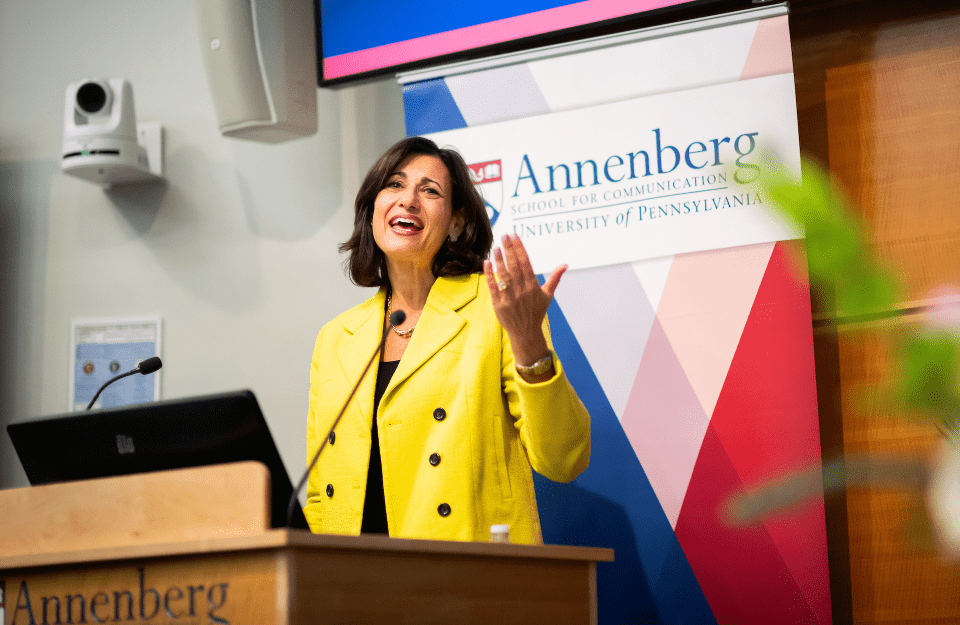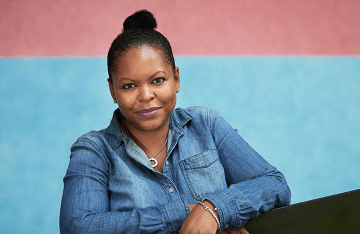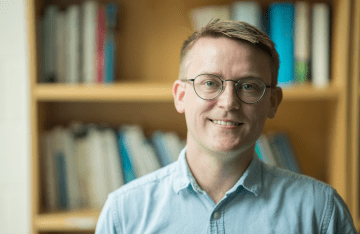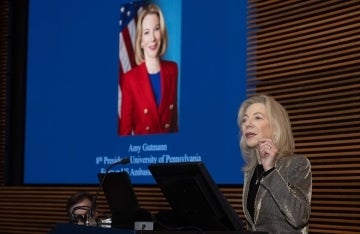In the Annual Annenberg Lecture, Former CDC Director Rochelle Walensky Explores the Complexities of Communicating Public Health Information
Walensky, director of the CDC from January 2021 to June 2023, discussed communicating health information during the unprecedented COVID-19 pandemic.

Rochelle Walensky, the 19th Director of the Centers for Disease Control and Prevention, gave the annual Annenberg Lecture in November. (Photo: Eric Sucar)
As director of the CDC in the early stages of the COVID-19 pandemic, Rochelle Walensky had the formidable job of helping to lead the nation — and the world — through unknown times, communicating ever-evolving public health threats and scientific breakthroughs from 2021 to 2023.
A medical doctor and an infectious disease researcher, Dr. Walensky served as a frontline worker before beginning her tenure at the CDC in January 2021, following the development and initial implementation of the first COVID-19 vaccines.
At this year’s Annenberg Lecture, held at the Annenberg School for Communication at the University of Pennsylvania, Walensky spoke about her tenure at the CDC and the complications that come with communicating complicated health information to the public in an age of mis- and disinformation.
“Through her work as an academic and a community advocate, Dr. Walensky has lived through what we teach in the classroom – finding the best ways to communicate public health threats to identify and combat misinformation,” said Sarah Banet-Weiser, Dean of the Annenberg School. “Her engaging and thought-provoking presentation captivated the audience, making her the perfect choice to deliver this distinguished lecture.”

Drawing on her experience as a doctor and as a public health communicator, Walensky discussed the difficulties of breaking down complex statistical information, building and maintaining trust with the public, and the importance of effective communication in public health.
Walensky explained that, unlike when she was in a classroom or at the bedside, at the CDC she was seen as political, even when she was just sharing scientific facts.
“I was sworn in on January 20. By January 27 of 2021, I was embarking on three times-a-week press conferences with the White House,” she told the audience. “Soon thereafter, I realized that when I’m standing in front of a White House banner, people automatically think I'm political, even when I’m just delivering the science.”
Walensky explained that she had to quickly learn how to break down complicated science for breaking news reporters who didn’t typically cover health issues and were already faced with misinformation online.
Kathleen Hall Jamieson, Elizabeth Ware Packard Professor of Communication and Director of the Annenberg Public Policy Center, home of FactCheck.org, told the audience that she was impressed by Walensky’s handling of such a difficult situation and grateful that she was willing to take on the job.

“When [Walensky] joined the CDC, scientists around the world were trying as best they could to understand a deadly, morphing virus in a polarized environment rife with misinformation,” Jamieson said. “She had to be a spokesperson for one of the central agencies in the world that was trying to provide the information we needed while accelerating the science that we needed, all while ensuring that we got the behaviors that increased the likelihood that we were protected.”
One of the most challenging parts of the job was communicating statistics, Walensky said. Americans are notoriously bad at math — 30% of American adults can only perform very basic elementary-level math tasks — and doctors are not great at communicating hard quantitative metrics to the public, she says, something necessary to share information about the effectiveness of vaccines or how many people are sick in a specific zip code.
What’s more, these numbers are constantly changing during an ongoing pandemic.
“When I started at CDC, I said, ‘I will lead with science and integrity.’ I wish I had added, ‘and the science will change,’” Walensky told the audience. “Because science is the pursuit of knowledge. As we learn more, we have more to learn."
Walensky noted that all doctors, health practitioners, and public health leaders should care about the field of communication.
“When I go into schools of public health and am asked, ‘What aren't we teaching?’ I say communication,” Walensky noted. “Your successes are only as large as your ability to communicate them.”
The annual Annenberg Lecture brings to Penn leaders in academia, politics, public policy, or the media. It combines two previous lectures, the Walter and Leonore Distinguished Lecture in Communication, which started in 1992, and the Leonore Annenberg Lecture in Public Service and Global Understanding, which began in 2006. Both series, and the subsequent single lecture, honor Ambassador and Mrs. Annenberg, without whose vision and support the Annenberg School and Annenberg Public Policy Center would not exist.



